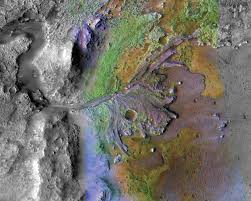The next technological marvel in Mars lander technology is brought to us by our favorite civil service agency NASA, has safely touched down on the red planet without incident on February 18, 2021 just before 4pm EST. The Mars 2020 Perseverance Rover will augment existing landers and rovers and is the the USA’s newest Mars mission to bring new and ground breaking science to the red planet in the search for water, past life and mysteries heretofore unknown to be discovered. The Earth-Mars travel distance is 131.33 kilometers and was punctuated by a nerve racking plunge into the Martian atmosphere. The EDL (Entry, Descent and Landing) team notified the NASA control room that the rover touched down on the planet and is sending the proper heartbeat signals. These signals are relayed by the Mars Reconnaissance Orbiter (MRO) which has been in orbit around Mars since November of 2006. The MRO is currently in the critical role of high-speed data-relay for all experiments and other orbiting spacecraft in the Mars region. The MRO is a completely different mission with it’s own science objectives. I’ll be writing an article on the MRO in the coming months but if you’d like to learn more the Missions link on the NASA.gov website is very informative.

Now that the Mars 2020 Perseverance rover, or Percy the rover, is on Mars, what are the next steps? Well surprisingly things are going to move very slowly the first month. A lot of infrastructure needs to be set up for ground to satellite to Earth communications. Interfacing Percy to the existing MRO high speed data relay is of prime importance as this will be Percy’s proverbial lifeline to Earth. Software upgrades and tweaks for the myriad of computers systems and science instruments as well as logistics involving line of sight scheduling with Earth for critical somewhat (one way communications can take anywhere from 3 to 20 minutes depending on communications relay so double that for round trip) delayed time communications as well as to relay critical mission reporting and heartbeat information all needs to be laid down. As humans venture further out to the stars it will be the infrastructure and engineering we set down today that will get us to our astronauts to future destinations such as Mars and beyond. The other great little toy and a NASA first is the inclusion of the helicopter Ingenuity tucked away in the underbelly of Perseverance’s chassis. There is a MastCam-Z camera system that needs be tested and the robotic arm/mast that the camera is attached to needs to be put through it’s paces. The new camera has the ability to take high resolution color images from multiple interesting vantage points. This rover has more camera’s than previous rovers including camera’s on the rovers wheels, which it is hoped will help from getting Percy stuck, like the Spirit rover of years past. Of course testing the movement of Percy herself with short movements will give the short testing cycles the engineers need to be confident of their new systems as well as give the drivers some experience with their movement interfaces. There’s a tech demo designed to generate oxygen from the Martian atmosphere. There are many more subsystems and science projects that Perseverance has brought to Mars to further test geology as well as test for the existence of past life on Mars. Jezero Crater, where Perseverance touched down is believed to be an old lake bed. If you look at the small image above of the Jezero Crater area, the actual landing spot is that circular depression seen in the (river) delta. This landing site was specifically chosen as an area to roam and search for the existence of past life and to test the outlying geology of this lake bed to see what it has for exploration. As you can see there is much for Perseverance to do in the coming days and weeks.
So Perseverance will pretty much stick to the area where it landed and do what science it can while the communications infrastructure and scheduling of big science logistics takes place. There’s much groundwork to be laid in the coming weeks and we definitely look forward to all the big science this mission will bring. The first flights of Ingenuity are expected around early spring with the more heavy duty science following and throughout the North American summer. There is a video of the actual touchdown of Perseverance on the web if that’s something you might find interesting. I have yet to look at it myself.
In future articles we will keep abreast of this mission and report on new discoveries and interesting science that Perseverance will bring us. Additionally we will go in depth into some of the science experiments and give more details on Ingenuity, the exploration helicopter as well as other science experiments. All of this information will be forthcoming and can be accessed via the NASA link on the homepage: https://azure.zettabytes.org/NASA
